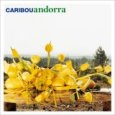Caribou "Andorra"
 This album was a hard one to get, but when I did, I was blown away. It is dense and flowery: a striking transistion from Caribou's earlier style, but still definitley sounds like Caribou. Andorra is a big move forward for Dan Snaith.
This album was a hard one to get, but when I did, I was blown away. It is dense and flowery: a striking transistion from Caribou's earlier style, but still definitley sounds like Caribou. Andorra is a big move forward for Dan Snaith.
I recently caught a documentary on VH1 on the making of Phil Collins' fist solo album, Face Value. There was one scene where Collins and an engineer were sitting at the mixing board pulling apart the tracks of Phil's cover of The Beatles' "Tomorrow Never Knows" revealing layers of backwards violin tracks, some pulled from other songs on the album, hints of other melodies floating into the final mix of the song. Andorra sounds like Caribou's Dan Snaith was given access to the master tapes some of those opulent multi-track classic rock albums and allowed to pick and choose the most surreal elements to build his songs out of. There are ghostly melodies hinting at other songs here and there, but with Snaith's focused, dense layering of sound and his new addition of beautiful multi-part vocals, Andorra sounds more like a lost Elephant Six album than anything else in the Caribou back catalog.
From the album's opening, "Melody Day," we're hit with a 4/4 beat, light guitars and pianos. This light psychedelic pop is far from the cherubic and ecstatic post-techno Snaith started out with, but at the same time, it is a logical extension and conclusion of his oeuvre. The next track, "Sandy," pushes this new approach to '70s psych-lite vocal pop. It is simply arranged with the drums and a high register bass line up front, and the synths and electronics pushed to the back of the mix, and capped with a heavy vocal melody. And damn that chorus, I don't think The Mammas and The Papas could have ever sounded this good.
It's not until the third song, "After Hours," that that Snaith gets back to his familiar syncopated, polyrhythmic style that made Milk of Human Kindness so powerful. But as the song progresses, that intense drum attack is traded in for softer airs. The drums are heavy and up front in the mix, but serve more to pull the listener in to subtler guitar and synthesizer work. If I were still a college radio DJ, this would definitely be the track I would pick as a single to play, but I know that more people are going to gravitate to the lusher vocal styling this album has to offer. Caribou is shifting from being a "player's" band and becoming a "songwriter's" band.
Snaith has grown out and away from his isolationist beginnings, where he made music in his rural Canadian home and is blossoming into a fantastic song writer. The album is dense and a drastic transition even from what …Human Kindness was two years ago. I thought of myself as a Caribou fan, and found this CD hard to absorb. It takes a while, but it is immensely rewarding after several listens.
Andorra is a rare kind of album. It is intricately assembled, the songs move through their own climaxes and denouements like a play. Snaith has arranged the songs as to compliment each other and display their strenghts in shared themes. A lesser artist attempting such a bold album as this might have failed in the ordering of songs. Snaith dosen't let the best material pile up on one half of the album, nor does he lump all the more divergent material together. He built Andorra up slowly, teased us with what was coming, and at the end, leveled the room with an insurmountable expression of beauty and joy.
The album opens beautifully and strikingly, Snaith showcases his voice and a new found love of pop sensibility. The middle dives deeper into '60s pop, sounding as golden and bright as any imaginary summer afternoon could be, and all the while still sounding like Caribou. "Eli" stands out in this bunch with a heavy one string guitar riff and a children's choir, it may be the most shocking song on the album. It is so far from anything I'd imagine Caribou to come up with and so deep into the vaults of classic American pop. As immediately divergent as the first two thirds of the album sounds, Andorra's closing is a refreshed return to form, "Sundialing," sounding the most like earlier Caribou out of all the songs, "Irene," a soft ballad with a cool, bubbly vibe and wispy drum machine, and the closer, "Niobe," is just mind blowing: nine minutes of intense building and release. As most of the CD explored earthy California psychedelia, "Niobe" is a launch into space. It is the most minimal song on the disc: drums fading in and out, fills punctuating the song, marking out points for the dense layers of electronics to shift, start and stop. Where most of the album focused heavily on the vocals, "Niobe" shifts away from the pop harmonies to subtler repetitions of a few lines shifting in and out of the mix. "Niobe" closes this daring and adventurous album with what might be the best song of Dan Snaith's career.
samples:



